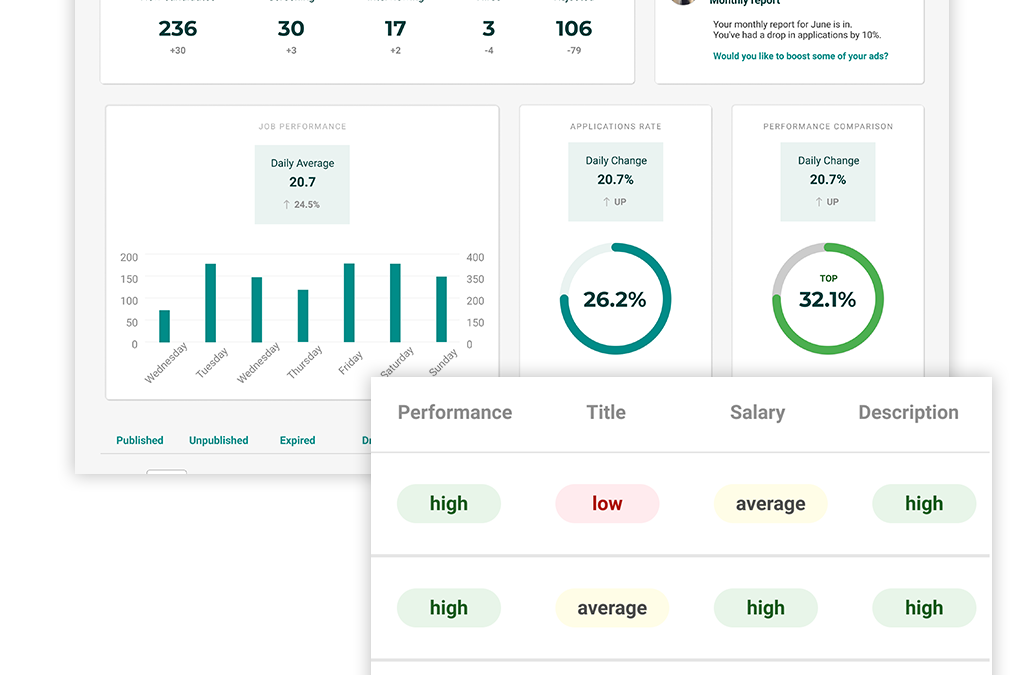Crafting an effective job advert can be challenging but there are some simple ways to improve your post to attract more interest and quality applications.
These are our top 8 tips to inject a little va va voom back in and instantly improve the performance of your job adverts.
Include a salary range on your job advert
By not including a salary range, you could be eliminating potential candidates. On Simply Law, jobs that include salary information tend to receive more applications.
Jobseekers will often seek a new position for a higher paid salary, so your job advert needs to be attractive in order for them to consider applying.
By posting a salary range, you will also be safe in the knowledge that each applicant’s salary expectations have already been met.
It would be a waste of time for both the jobseeker and recruiter to proceed through several rounds of interviewing, only for them to drop out at the 11th hour if the pay grade is deemed too low.
Make sure your job advert isn’t too long or short
The perfect length of a job advert isn’t an exact science but studies have found that job adverts with 150 words or less receive more applications. That’s not to say that you shouldn’t include relevant information – just be as concise as possible, ensure the jobseeker understands the role and expectations, and focus on capturing imagination with the words you do use.
Jobseekers spend approximately 30 seconds reviewing a job post so it’s crucial that you get to the point quickly.
It’s also worth remembering that many jobseekers will view job adverts on their mobile devices so information should be laid out in a neat and engaging way for it to be easily digested.
Post your job at the right time
The best time to post a job is when more jobseekers are active on our site, so they appear at the top of a jobseekers search. We find that on Simply Law Jobs, more jobseekers are active earlier in the week, between 2pm and 3pm.
Use an effective job title
A job title should use standard industry language so it can easily be searched for. Avoid long, fancy or overly creative job titles as these won’t generate you any more views or applications. It’s also wise to steer clear of abbreviations and acronyms for the same reason.
Avoid job titles which imply gender, age or race to promote diversity and inclusion in the workplace.
Examples of good job title descriptions
In-house Solicitor
Legal Secretary
Examples of bad job title descriptions
Solicitor/Associate (3-5 years PQE) Real Estate/Land & Rural Business, Kent
Snr Legal Secretary
Stand out from the crowd
On a busy job board, you need to stand out from the other job adverts to increase interest in your role. More interest equals more relevant applications. You need to think, what would make candidates want to apply for this job?
This could be:
- A competitive salary range to entice jobseekers who have a specific salary in mind.
- Perks which aren’t related to a basic salary. This could be bonuses, flexible working hours, overtime or an exciting company culture.
- Clear information, describing exactly what they are looking for. Vague descriptions will only attract substandard applicants.
- Enthusiasm in your tone of voice. Use stimulating words to capture the jobseekers imagination. Get the jobseeker excited about the prospect of working for your company!
Include information on company culture
Jobseekers aren’t just looking for a job these days, they’re looking for a career that aligns their values and beliefs. They’re looking for signs that they will feel happy and fulfilled if they take the position.
By including a short section about the company culture, and the types of people that already work there, jobseekers can envisage if they would be a good fit for your business.
For example, if your business was more formal, you could write, “When you join us, you’ll be living up to the highest standards of professionalism. Only jobseekers with superior skills and a great attitude will make the grade.”
If your business was less formal, you could write, “We love innovative, talented and fast-acting people who hate waffle and love getting stuck into hard work.”
It doesn’t need to be too long as jobseekers can search for further information on your careers page – just make sure the information matches!
Provide further information about the process
Understanding what happens after their application is very important to jobseekers; if they are going to take the time to apply, they would like to be aware of time scales and what is further expected of them.
Providing some basic interview tips is also important as candidates have a lot of questions about how to prepare for a potential interview. Briefly outlining these tips will also save you time going back and forth with questions later on.
Settle any worries about Covid-19
Covid related concerns are really common at the moment. Candidates want to know about the working environment, working from home arrangements, safety practices, job security and how Covid has affected the business.
Employers should be prepared to answer difficult questions like these and the more information they can provide up front, the better.

How to turn employer branding into quality job applications
It’s common knowledge that the hiring process is a much more collaborative experience than it was a few decades ago. While a candidate will need to impress you during the interview to secure the job, you will now need to impress the jobseeker enough for them to take...

Discover the factors affecting your jobs’ performance with the Reporting area
In this guide we’ll be taking a closer look at the job performance table, which you can find at the very bottom of your Reporting area.This table gives you the most in-depth insights out of all the reports on your account, providing you with a super-detailed look at...

Tracking your jobs’ performance: how to turn insights into actions
In this guide we’ll be taking a closer look at the Reporting section of your recruiter account. We’ve designed the reports in this area to help you gain a better understanding of your jobs’ performance, providing you with insights that can help you take proactive...



